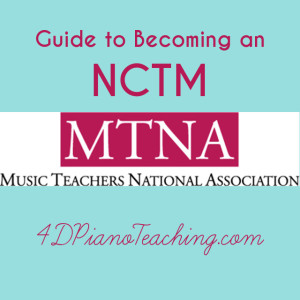 I began the process of becoming a Nationally Certified Teacher of Music (NCTM) through MTNA this past March. If you are not already an NCTM, I thought I’d share with you a little bit about the process, and hopefully encourage some of you to become certified as well!
I began the process of becoming a Nationally Certified Teacher of Music (NCTM) through MTNA this past March. If you are not already an NCTM, I thought I’d share with you a little bit about the process, and hopefully encourage some of you to become certified as well!
You can get all the detailed information on the MTNA Certification website, but it can be a little overwhelming. I’m going to give you a general overview of the process today, and in the coming posts plan to give more specific information about each of the five Teacher Profile Projects (TPPs) that you must complete for certification.
To begin the process, all you have to do is fill out this simple form and send in the correct fee (for MTNA members $200, $350 for nonmembers). Once you turn in the application you have a year to complete and turn in the TPPs for review. MTNA sends you a link to upload all documents for review. If any project is “evaluated as insufficient” certification is deferred until that project is considered “sufficient.” Meaning, they’ll give you a chance to fix it before denying your certification and keeping your non-refundable fee. The five TPPs are:
- Write Your Teaching Philosophy
- Analyze Four Teaching Pieces
- Present Your Teaching
- Share Information About Your Teaching Environment
- Discuss Your Studio Business Ethics and Policies
So why would you want to pay $200 and do all this extra work to become certified? The MTNA certification website elegantly states:
“Certification is a process that validates an individual’s qualifications for a specific field of professional practice. It demonstrates to employers, clients, and peers that which the individual knows and is able to do. It signifies commitment to continued excellence in professional practice. In addition, it increases visibility, builds credibility, provides a goal for personal professional achievement and validates expertise for the individual and to those outside the field.”
Certification validates piano teaching as a profession and shows your students and parents of your students that you are well-qualified to teach. So many other professions require certification to become employed (school teachers, hair stylists, accountants, lawyers, plumbers, etc.) and even though piano teaching does not, it makes a statement that you are a professional and sets you apart from “the person down the street who happens to play piano and can teach some too.” Also, it’s never a bad idea to evaluate your teaching, policies, and practices.
Don’t forget – today’s your last chance to sign up for our “Student’s Guide to Effective Practicing” giveaway, don’t miss your chance to win!
Author: Spring
Spring Seals, NCTM, teaches 60 piano students ranging from age 3 to 70 in Fort Worth, Texas. She also serves as the Director of Certification for TMTA. She is passionate about helping teachers become more effective in their studios through professional development, new resources, and fresh ideas.
